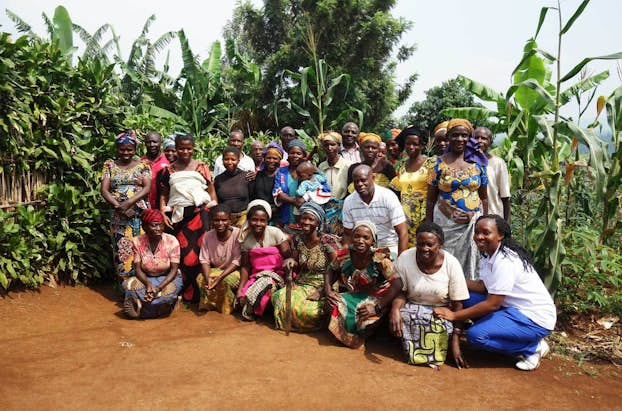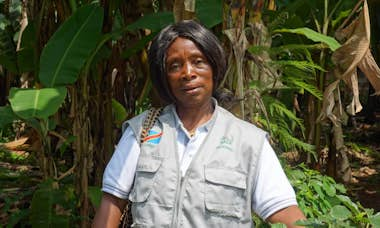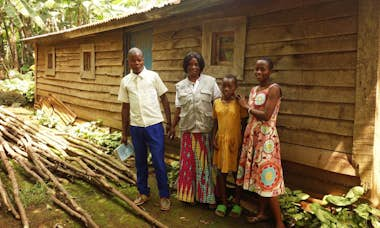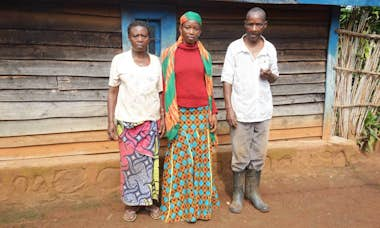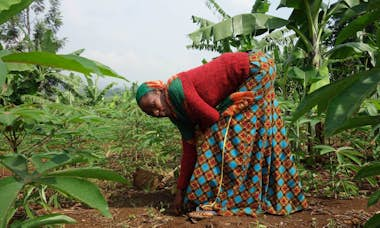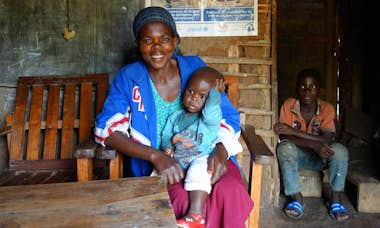- News
NATURATA & SOS Faim fundraising campaign: This is how you contribute in South-Kivu
Christmas is getting closer and the first presents are bought for the loved ones. If you want to do further good for the people in the Congolese province of South-Kivu, we appeal to your generosity during your grocery shopping at our NATURATA stores: we want to help – do you join us?
Since the beginning of our fundraising campaign in cooperation with the Luxemburgish aid organisation SOS Faim and its local partner “Amis du Kivu” three years ago, we made essential progresses in the frontier area between the Congolese province and Rwanda and Burgundi. The following insights are a resume on the most important developments in the region based on the autonomous work of the rural farmers and their communities and not the short-term help of international aid programs.
Charles Cikomola, general secretary of “Amis du Kivu” precisely explains the philosophy of the NGO:
“Some NGO’s still continue to distribute sacks of rice, without caring about the fact that their charity prevents the rural populations from starting their own activities. The farmers need to renew their livestock and to regain their production tools to cultivate their acres – no food, that falls from the sky that makes them dependant on external help.”
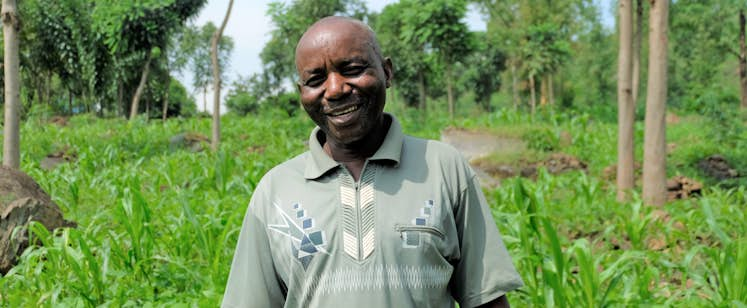
The objectives that have already been achieved in the past years are worth showing and the success of last year’s fundraising action is remarkable. After transferring the donated money during the campaign period 2019/20, “Amis du Kivu” has used the resources for a multitude of individual projects on site:
Employment of the donations from 2019:
Employment of the donations from 2019:
Recipients of the donations:
- 48 villages, 14 of them joined in 2019
Practical results:
- Continuing education for 58 representatives of the villages on agro-ecological methods as the base of a sustainable agricultural production
- 41 976 trees planted for the improvement of the water storage capacity of the soil
- 250 composts that provide 41 200kg of manure to the members of the fields
- Trainings for 28 households, that mulch their fields from now on to fight soil erosion and drought.
- Distribution of 66kg of seeds of green manuring.
- Exchange visit to demonstrate the impact of fertilisation through green manuring, composting and agroforestry: a compost has been installed, green manures haven been cut and planted and the technique of mulching for the protection of the soil has been demonstrated.
- Production of a documentary about the agro-ecological activities of “Amis du Kivu”.
In addition some construction and infrastructure projects:
- 10 tree nurseries, that are autonomously managed by local communities, the following was made available in 2019:
- 160kg of seeds for the means of agroforestry
- 5 tools for tillage including mattocks, watering cans, machetes, arrow grass, rakes, twines, buckets and decametres
- 1 trained nursery gardener
- Project “demonstration fields”: agro-ecological methods and organic fertilisation of the soil in 25 selected fields to demonstrate the results in comparison to neighbouring parcels of land, support with the installation of a compost for demonstration means, new seeds of green manuring and food crops (corn and beans) and tree seedlings stemming from the nurseries.
This pleasant evolution perfectly blends in with the positive trend of the previous years.
Click on the names to get an insight into how your donations in Luxembourg improved the lives of Furaha, Odette and Rita.
Furaha Benite Mudiahama Buhendwa – 58 years old, 15 children
Furaha Benite Mudiahama Buhendwa – 58 years old, 15 children
Widow since 10 years – 15 children of which 10 under her care
Furaha Bénite lives in the small village of Bushumba next to the Lake Kivu. She makes a living for her family thanks to her agricultural activities. She grows manioc, corn and sugar cane.
After the passing of her husband, she started to cultivate coffee beans, a crop that generates a lot of income. In order to get the production started, Bénite joined an agricultural cooperative called RAEK. This enables her to mutualise certain tasks like washing and drying the coffee beans and safeguards a lucrative market for its members. A further advantage is that she has to pay fewer taxes as if she sold her vegetables alone on the local market. Moreover, Bénite receives her remuneration immediately after the harvest.
“I am a woman and a leader, I need to fight to raise my children!”
Thanks to the cultivation of coffee beans, Bénite was able to significantly elevate her income and improve her everyday life by building a sheet metal house. This makes of her the first woman in her village to succeed in building a house by herself! Her determination as well as her autonomy serve as perfect examples for other women from the village. She sees herself as a leading woman and does not hesitate to promote her activities to value the importance of working as a collective and to encourage other women to emancipate themselves.
“I am very proud of sensitising other women to work jointly in a cooperative and cultivate coffee beans, which is a good income opportunity. When women produce the food, the generated money stays in the family.”
Odette Nshobole – 20 years old
Odette Nshobole – 20 years old
Odette is a young woman from South-Kivu that finished high school with a diploma. Unfortunately, her family was not able to pay for further studies. Thus, she has been working for two years now along with her parents on the family farm, where 16 people live in total.
The farmers cultivate small acre fields: manioc, beans, corn, yams and potatoes are their basic food. The agricultural production is sufficient to feed the family. In case the family needs liquidity, they sell some bananas or a chicken.
Odette and her family have been supported by the partner NGO Amis du Kivu for two years now in order to improve soil fertility, which is vulnerable to erosion. Odette built a compost that generates natural fertiliser and hence doubled the crop yields of beans, which enabled her to sell the surplus. With this additional income, the family can finally renovate their house and pay for school.
Rita Mastaki – 35 years old, 9 children
Rita Mastaki – 35 years old, 9 children
Rita is a housewife and mother who designates each day to educating, feeding and working for her family.
5h00: Rita gets up and provides water from the village well, which will last for the entire day.
5h30: She wakes up her children et prepares a light meal for them before they leave for school, which is in two hours walking distance.
6h00: The children start their journey and won’t be home until 3pm. Rita cleans up the house and starts working on the parcels round her house. Her man cultivates their acre fields that are further away.
13h00: Rita cuts wood, which will later serve to cook diner.
15h00: She comes back home to welcome her children and starts preparing diner, the only consistent meal of the day. The oldest of the children helps his siblings with homework before they play outside.
18h30: At dawn, Rita calls her children to have diner, which is illuminated with a petroleum-lamp. The family spends the evening together with talking until they go to bed around 8.30pm.
“My priority is to send all of my children to school once I have enough money.”

